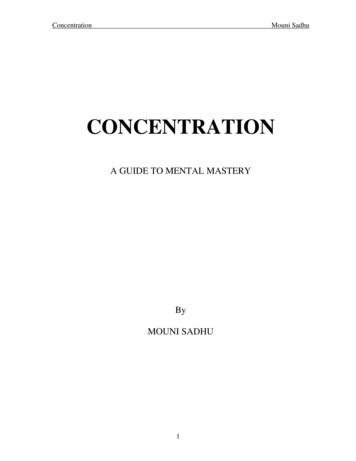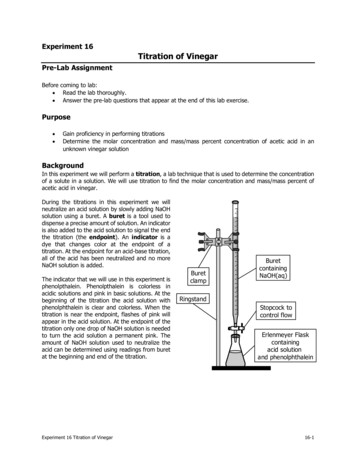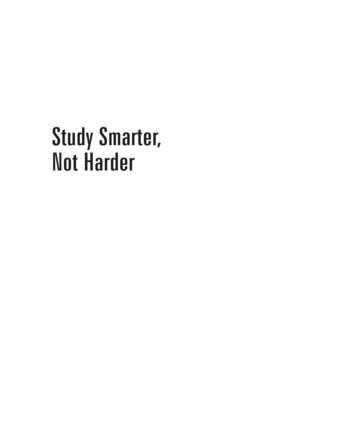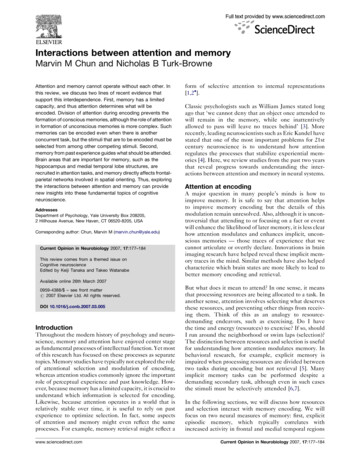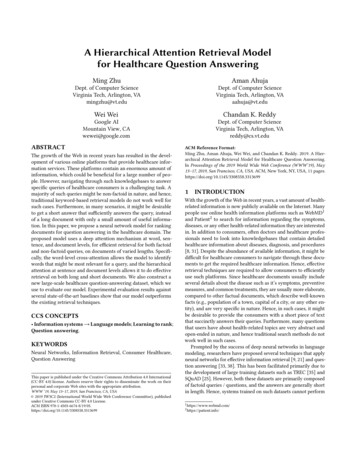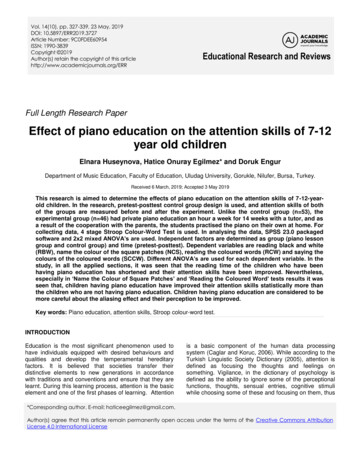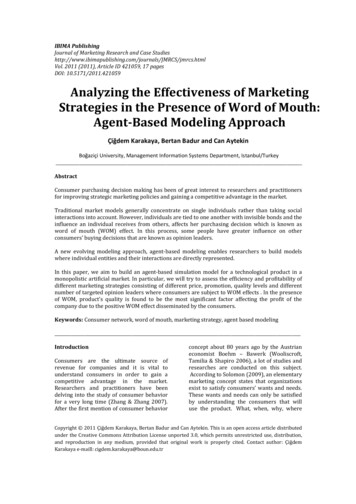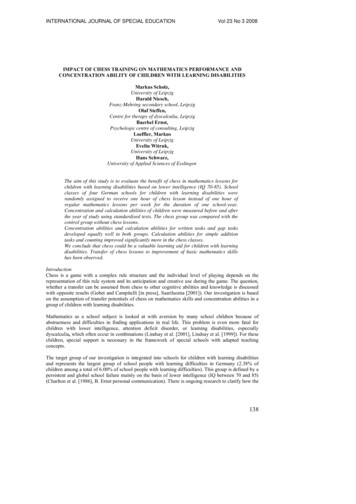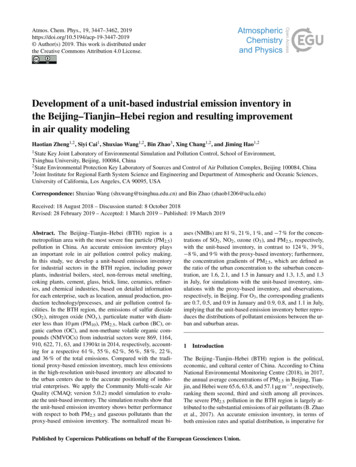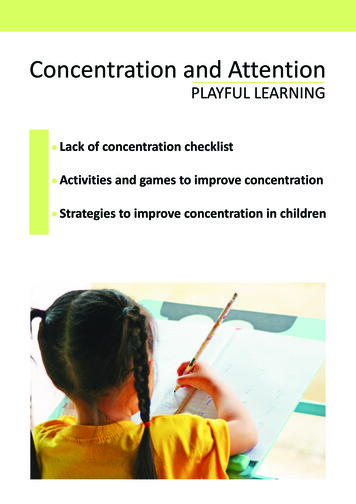
Transcription
Concentration and AttentionPLAYFUL LEARNING- Lack of concentration checklist- Activities and games to improve concentration- Strategies to improve concentration in children
Lack of Concentrationand AttentionAttention and concentration difficulties are very common inchildren. Children are super energetic and curious. That why makingthem sit down and do a task without distraction, can be quite a task.Their focus is so short-lived that sometimes even the new toys attracttheir attention for just a few hours or less. Things may get worse whenyou make them do activities like homework that require active mentalpresence and concentration.Concentration becomes an important way in which children canexploit their intellectual capacity when they start school, if not before.This means that they have to focus their attention on the tasks andblock out distractions. Lack of attention and concentration difficultiescan cause problems at school as well as in later life.But, like any skill, concentration can be improved and madeautomatic. It is possible to help a child focus on a task and increaseconcentration skills for a longer period of time. Simple activities andconstant motivation can help children improve their attention. The trickis to be consistent.But first, check if your child lacks attention.
Lack of concentration checklistYesNoDoes your child find it difficult to concentrate on one activity at a time?Does your child quickly lose interest in a game or activity and look forsomething else immediately?Does your child find it difficult to concentrate on tasks in an ageappropriate manner? Does he or she lost interest before finishing?Does your child abandon jigsaw puzzles, memory game or drawingsregularly?Does your child get easily distracted by trivial things instead of continuingwith the task at hand?Has your child difficulties in learning and remembering?Does your child have trouble concentrating on homework and isprogressing slowly?Is your child often oblivious to his or her environment? Is he or she oftenlost in daydreams?Does your child tire easily when doing compulsory tasks and quickly loseinterest?Does your child often make careless mistakes when completing tasks?Does he or she easily overlook details or copy information downincorrectly?Does your child often sit in front of the television as if hypnotised? Doeshe or she occupy him- or herself with PlayStation or computer games forhours?Can your child only listen for short periods and superficially? Has yourchild difficulties precisely repeat what's been said?Do you feel that what you say to your child often goes in one ear and outthe other?Has your child difficulties in following spoken directions without needingto hear directions several times?Has your child poor handwriting compared to kids of the same age?Does your child display poor gross motor skills like running or jumping?Is your child sometimes aggressive or moody?myhomeschoolmath.com2
Activities to ImproveConcentration in ChildrenLearning to concentrate can be a difficult task for primary-school children. Experts believe thattypically, a child can concentrate hard for 3-5 minutes for every year of their life: so a five-year-old maybe able to focus for around 15 minutes, while a 10-year-old can stay on task for the best part of anhour.However, many children find it hard to concentrate for even short spaces of time, particularly ifthe activity they're working on doesn't engage them, or if there are lots of distractions. But it ispossible to improve their attention and focus without it feeling like a chore for you or your child.Concentration is like a muscle that requires regular exercise to strengthen. Here are some games thatcan help your child develop stronger concentration and achieve more.1. Focus / thinking games & exercisesJigsaw Puzzles- a jigsaw puzzles are a fantastic tool for improving attention and concentration,hand-eye coordination and thinking in a logical way to solve a problem.(you can find online puzzle for kids on: www.myhomeschoolmath.com/onlinepuzzle.html)Card games - Memory or Unocan improve attention for numbers and pictures and concentrationand attention span.(you can find online memory games on: d puzzles - can improve attention for words.Dot to dot game- help in improving the observation skills, concentration, attention and fine motorskills.Mazes- help in improving the observation skills, concentration, attention and fine motor skills.Spot the differences - help in improving the observation skills, concentration and attention.Matching Letters - matching the numbers to their corresponding letters - help in improvingconcentration and attention.myhomeschoolmath.com3
Focus / thinking games & exercises - Crossword puzzlesemiteaYWhere do the words belong?ANTBEEBIRDDONKEYLIONMOLERABBITVULTUREyou can find more crosswords on: olmath.com4
Focus / thinking games & exercises - Dot to dot gameWhat is on the picture?Connect the dots from 1 to 22 and from 1 to 20 and find 72216146221175211820you can find more dot to dot games on: math.com5
Focus / thinking games & exercises - MazesHelp the dinosaur find its little one. Which way must Dino take?you can find more mazes on: .com6
Focus / thinking games & exercises - Spot the differencesFind 10 differences.you can find more differences on: oolmath.com7
Focus / thinking games & exercises - Matching LettersMatch the numbers to their corresponding letters.Enter the letters below the picture in the correct order.1W2N3N4O5A6M7S1234567you can find more differences on: meschoolmath.com8
2. Pattern and routine instructionsThe link between sequencing and concentration is a strong one. Routines can also be fun whenplayed with a pattern.Patterns Worksheets - help in improving the observation skills, concentration, attention and fine motorskills.you can find more differences on: ine InstructionsHow to play: Make a pattern with instructions, for example: Put your books into the bag, then keepyour shoes away and then wash your hands. If you have more than one kid at home, you can make them compete on who does it right at the shortestpossible time.myhomeschoolmath.com9
3. What was not on the table?It's a great visual, memory and concentration boosting game for kids.How to play: Put 5 to 10 things on the table - pencil, spoon, gum, dice, match and so on. Let your childtake a look for minute or two, and then ask him or her to close eyes. Change one thing with another,which was not previously presented. Your child will then open the eyes and find out what you havechanged.If your child easily masters the task, you can make the task more difficult and increase the number ofthings and/or reduce the observation time.4. Where is the coin gameThis game makes the child focus on the cups as you manipulate them.How to play: Place the three cups upside-down. Place a coin under one cup while your child watches.Rapidly switch the cups and ask your child to tell under which cup the coin is.5. Storyteller-PicturesStoryteller-Pictures can be used in a variety of ways and here are a few ideas how you can use them:Creative Storytelling:Have the child select multiple pictures and tell a story that contains all theselected pictures. In this way, younger children who do not yet know how to write but enjoy tellingstories will develop their creativity and imagination, as well as strengthen their vocabulary.Storytelling in a circle: Everyone chooses one picture. The first in the round starts a story that is in hispicture, then the next continues the story with the theme of his picture, and so on. Pictures can be takenout in the circle, as long as all are off, and then the story is finished.myhomeschoolmath.com10
Storyteller-Picturesyou can find more Storyteller-Pictures on: hoolmath.com11
6. Hidden object gamesFind the objects - Child must discover objects that appear in the different images.Find the detail - Child has to discover the details on the picture.Find the same and colour it.you can find more hidden objects worksheets on: meschoolmath.com12
7. Memory CardsPrint someMemory Cards, or make them on your own with pictures from newspapers or magazines.Place the card on the table in front of the child, face up, and leave it there for a few minutes until thechild recognizes and memorizes all the pictures. Then turn the card face down and ask the child whichitems were shown on the card. Change the cards and reduce the observation time.Remember all!you can find more Memory-Cards on: hoolmath.com13
8. TangramTheTangram puzzle consists of 7 geometric pieces, known as tans, which are normally boxed in theshape of a square. The objective of the puzzle is to form a specific shape using all seven pieces, whichmay not overlap. You can either buy this game, or make one using paper template.Then see whether your child can put together figures suggested by you or invented by him or her.AnimalsCamelCatSwanBirdFishHorseyou can find Tangram templates on: hoolmath.com14
9. Play Simon saysPlay Simon says. This game helps kids concentrate and follow directions and is thus a perfect game todevelop self-regulation.10. Just a minuteNever undervalue the importance of small activities or games. Lots can be done in a minute, and that'swhat you want to teach your child.How to play:Scatter around 20 balls in the room. Let your child pick up as many balls as he or she can in a minute.Start the timer and stop it after a minute. Let your child count how many she or he has collected. How many words can you write in a minute? How many animals can you name in a minute? aredifferent ways of playing the game. You can come up with new ideas for playing one-minute game.11. Tongue twistersThe popular game helps children improve concentration as well as pronunciation skills. It stimulatestheir hearing memory while entertaining them.How to play:Write some tongue twisters on the piece of paper. Give it to your child and ask them to read it aloud.Then let them read it faster and faster several times in row. Go ahead and say it together, this will makeyou both laugh.Here are a few tongue twisters: She sees cheese. Which witch is which? She sells sea shells on the sea shore. Round brown bread. A proper copper coffee pot. Shine my city shoes! Red lorry, yellow lorry, red lorry, yellow lorry. She said she should sit. My mommy makes me muffins on Mondays. Six thick thistle sticks. myhomeschoolmath.com15
Strategies to ImproveConcentration in ChildrenParents can have a big impact at home on education and they can do much to ensure betterconcentration. You can help your child increase his or her concentration in various ways. These wayswill teach the child certain habits and rules that would make it easier to focus and be less restless,while doing homework or carrying out tasks.Here are some suggestions how you can help your child develop stronger concentration andachieve more.1. Set up the right ambience to studySet up the environment that suits your child. Understanding what kind of environment your childprefers to study is the first step to increase concentration level in him/her.Reachable material - Keep everything that is required at hand so that your child does not need to get upto get anything. All homework books, crayons, textbooks, pencils and even water can be kept on thetable or nearby. All these help kids improve focus and increase attention!Other external factors that should be avoided: Light too dim/bright, Temperature too high/low, Timepressure, Discouraging words from others.2. Minimize distractions (TV, people talking, music, telephone)Children are not great at filtering out the noise. Therefore, give your child the right ambience toconcentrate.If your child is doing some activity, do not sit near them and talk to somebody or watch the televisionwhile they are studying. A child's curious mind is always looking for distractions like a TV, a gadget oreven a small toy lying in the corner of the room. Especially when he/she is engaged with workdemanding concentration like homework. So it is important to make sure that before you sit your childdown for a task, the place is made free of all distractions, and that includes your mobile phone.Ideally, all gadgets including televisions, iPads, cell phones etc. need to be switched off or kept in adifferent room to avoid distractions. If you need to use a computer to study, make sure that it is usedonly for studying and nothing else.myhomeschoolmath.com16
3. Reduce screen time and gadgets timeInstead of giving your child electronic games to play with, give them traditional, physical games. Buythem things that propel creativity and thinking while having fun.Allot a certain hour for your kid's daily screen time when they can watch TV or the internet. Be anexemple and watch less television and use mobile for a lesser time.Studies have shown that gadgets actually reduce attention span and memory power of children so theyshould be used sparingly or not at all.4. Set goalsThe goals need to be achievable. Divide their study time into various categories. Prepare a timetable forall their activities such as play time, study time, hobby time, etc.Reward them with token gifts when they finish all the tasks in a week or a month.5. Fix a routine to followRoutines help children get accustomed to a study schedule. This not only helps with time managementbut also helps program your child's brain to know when he has to study. And this in turn helps toincrease the child's concentration in studies!6. Give daily responsibilitiesSimple daily tasks that require order can help to improve.Depending on your child's age, hand out responsibilities like setting the table, making a sandwich withyou, sorting the cupboard and the like. Change the tasks on a regular basis so that your child does notlose interest.7. Prepare your child for the next taskPrepare in advance for the next task. When your child is busy, tell him what he has to do next, but allow afew minutes, till he stops and starts the new activity.myhomeschoolmath.com17
8. Take BreaksTake short breaks; concentration time is approx 20-40 min. Giving them time to vent out their energyonce their time limit for a task is up may actually help them focus better on the next task! It would help ifyour child did something completely different during this time.9. Break bigger tasks into smaller onesSometimes doing a task at one go is overwhelming for kids.It becomes easier for them when time-consuming tasks or difficult ones are divided into smallachievable tasks so that the child feels a sense of accomplishment for finishing a small task and this willmotivate him to continue on.10. Set up a reward systemChildren must feel motivated while doing a task.They need to feel accomplished when they complete a task. This helps children remain motivated andfocussed to perform more and better. When you see your child improving and doing things better, givethem a pat or some thoughtful gift.11. Practice simple breathing exercisesAn adequate amount of oxygen helps the brain function properly. Therefore, make your kid do somesimple breathing exercises. Practice the exercises together. They can do the breathing exercise in aroom, near a window, on the terrace or in the garden.Ask your kid to lie on their back and place a toy on the tummy. Now, ask them to breathe in deeply andraise the toy as high as they can without touching it. If the toy moves high, it means their lungs are filledwith air.12. Use fun activities to make them focusYour kid will pay attention when the subject spells fun. Spend the spare time and weekends playing funfilled concentration games for kids.myhomeschoolmath.com18
13. Naps and breaks boost concentration!Adequate naps and breaks refreshes the mind and boosts concentration. A power nap for 20 minutesafter school or in the afternoon helps increase concentration.14. Eat healthy, get enough sleep and exercise frequentlyEating healthy food has a direct link to how well a child concentrates and there are different foods thathelp increase a child's concentration. Experts say that eating greens and fruits inject the body withantioxidants which in turn boost the brain power.Lack of enough sleep: Sleeping is an important part of every child's routine. A good night's sleep can dowonders even in adults and so has its own importance in children. Kids need 8 - 10 hours of sleep everyday depending on their age. If your child has a habit of sleeping late, change the cycle, and set a routine.Help him or her sleep early so that they can sleep longer. Lack of sleep affects his/her concentration.Maintaining a routine sleep time is also very important. So make sure your child gets enough sleepevery day and that too at the correct time.Research shows that physical activities, such as running, cycling, playing football, etc., are not only goodfor children's body but also for their mind. It helps children focus better on what they are doing.15. Additional tipslBe patient, sensible and understand your child instead of scolding them. Remain calm and don'texpect too much of your child. Stress disables the brain. Only focused and relaxed can the childlllconcentrate effectively.Give your child time to rest, as concentrating is tiring. Relaxing between exercises is crucial.Please note: the younger your child, the more often he or she will need a break.Children sometimes find it easier to do their homework sitting, or even lying on the ground. Trythis out, and stick to the most successful version.The best concentration activities for children are those that encourage the child to think whiledoing the activity.Author: Mirjana Martan Pictures: 123rf.com 2019 www.myhomeschoolmath.commyhomeschoolmath.com19
Workbooks to ImproveAttention & Concentrationmyhomeschoolmath.com
- Memory ornoU can improve attentionorf numbers and pictures and concentration and attention span. - can improve attentionorf words. - help in improving the observation skills, concentration, attention and fine motor skills. - help in improving the observatio
